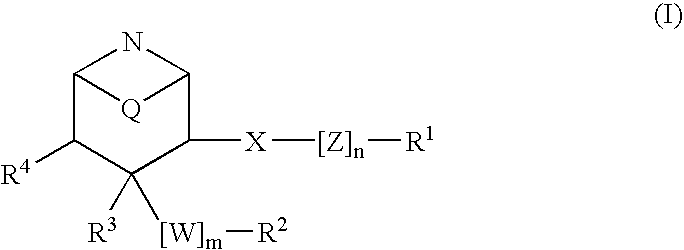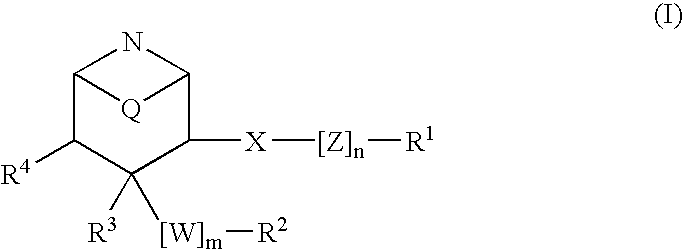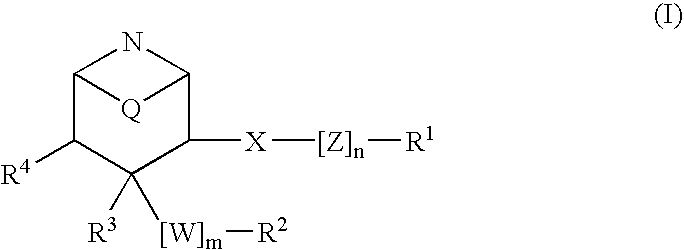Methods of treating alzheimer's disease
a technology of alzheimer's disease and treatment methods, applied in the field of compounds, can solve the problems of severe impairment and eventual death, no effective treatment for halting, preventing, or reversing the progression of alzheimer's diseas
- Summary
- Abstract
- Description
- Claims
- Application Information
AI Technical Summary
Problems solved by technology
Method used
Image
Examples
example a
[0437] The compounds of the invention are analyzed for inhibitory activity by use of the MBP-C125 assay. This assay determines the relative inhibition of beta-secretase cleavage of a model APP substrate, MBP-C125SW, by the compounds assayed as compared with an untreated control. A detailed description of the assay parameters can be found, for example, in U.S. Pat. No. 5,942,400. Briefly, the substrate is a fusion peptide formed of maltose binding protein (MBP) and the carboxy terminal 125 amino acids of APP-SW, the Swedish mutation. The beta-secretase enzyme is derived from human brain tissue as described in Sinha et al, 1999, Nature 40:537-540) or recombinantly produced as the full-length enzyme (amino acids 1-501), and can be prepared, for example, from 293 cells expressing the recombinant cDNA, as described in WO00 / 47618.
[0438] Inhibition of the enzyme is analyzed, for example, by immunoassay of the enzyme's cleavage products. One exemplary ELISA uses an...
example b
Cell Free Inhibition Assay Utilizing a Synthetic APP Substrate
[0442] A synthetic APP substrate that can be cleaved by beta-secretase and having N-terminal biotin and made fluorescent by the covalent attachment of Oregon green at the Cys residue is used to assay beta-secretase activity in the presence or absence of the inhibitory compounds of the invention. Useful substrates include the following:
Biotin-SEVNL-DAEFRC[Oregon green]KK[SEQ ID NO: 1]Biotin-SEVKM-DAEFRC[Oregon green]KK[SEQ ID NO: 2]Biotin-GLNIKTEEISEISY-EVEFRC[Oregon[SEQ ID NO: 3]green]KKBiotin-ADRGLTTRPGSGLTNIKTEEISEVNL-[SEQ ID NO: 4]DAEFC[Oregon green]KKBiotin-FVNQHLCOXGSHLVEALY-[SEQ ID NO: 5]LVCOXGERGFFYTPKAC[Oregon green]KK
[0443] The enzyme (0.1 nanomolar) and test compounds (0.001-100 micromolar) are incubated in pre-blocked, low affinity, black plates (384 well) at 37 degrees for 30 minutes. The reaction is initiated by addition of 150 millimolar substrate to a final volume of 30 microliter per well. The final as...
example c
Beta-Secretase Inhibition: P26-P4′SW Assay
[0444] Synthetic substrates containing the beta-secretase cleavage site of APP are used to assay beta-secretase activity, using the methods described, for example, in published PCT application WO00 / 47618. The P26-P4′SW substrate is a peptide of the sequence:
[SEQ ID NO: 6](biotin)CGGADRGLTTRPGSGLTNIKTEEISEVNLDAEF
[0445] The P26-P1 standard has the sequence:
[SEQ ID NO: 7](biotin)CGGADRGLTTRPGSGLTNIKTEEISEVNL.
[0446] Briefly, the biotin-coupled synthetic substrates are incubated at a concentration of from about 0 to about 200 micromolar in this assay. When testing inhibitory compounds, a substrate concentration of about 1.0 micromolar is preferred. Test compounds diluted in DMSO are added to the reaction mixture, with a final DMSO concentration of 5%. Controls also contain a final DMSO concentration of 5%. The concentration of beta secretase enzyme in the reaction is varied, to give product concentrations with the linear range of the ELISA ...
PUM
| Property | Measurement | Unit |
|---|---|---|
| Electrical conductance | aaaaa | aaaaa |
Abstract
Description
Claims
Application Information
 Login to View More
Login to View More - R&D
- Intellectual Property
- Life Sciences
- Materials
- Tech Scout
- Unparalleled Data Quality
- Higher Quality Content
- 60% Fewer Hallucinations
Browse by: Latest US Patents, China's latest patents, Technical Efficacy Thesaurus, Application Domain, Technology Topic, Popular Technical Reports.
© 2025 PatSnap. All rights reserved.Legal|Privacy policy|Modern Slavery Act Transparency Statement|Sitemap|About US| Contact US: help@patsnap.com



